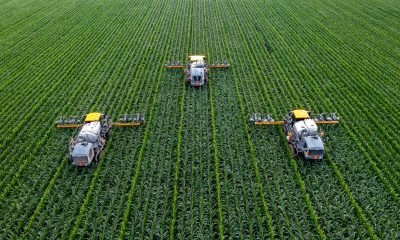Cannabis
Brazil’s Supreme Court Decriminalizes Cannabis Possession
Brazil’s Supreme Court decriminalized cannabis possession for personal use, a major shift amid longstanding debates. This decision, aimed at alleviating prison overcrowding and reducing racial disparities, aligns Brazil with other Latin American countries. While not full legalization, it marks significant progress, though future drug policy depends on ongoing legislative actions and societal response.

Brazil has made a key drug policy decision – the Supreme Court voted to decriminalize the possession of cannabis for personal use.
Although this does not mean full legalization, this step is important in the legal and social context for a country that has been struggling with the problem of overcrowded prisons for years. This decision puts Brazil in line with other Latin American countries that have previously taken similar steps.
The debate over the decriminalization of cannabis in Brazil has been going on for many years. Already in 2015, the Supreme Court began deliberations on this matter, but only now has it achieved the majority of votes necessary to make a decision.
The existing regulations were unclear and did not clearly define how much cannabis was considered possession for personal use, which led to many abuses and injustices in the legal system.
Content of the Supreme Court’s decision
In a vote that took place on Tuesday, the majority of Supreme Court justices supported the decriminalization of possession of cannabis for personal use. As judge Dias Toffoli emphasized: “No drug user should be treated as a criminal.”
However, this decision does not mean that cannabis has become legal – its consumption in public places is still prohibited. Judges have yet to determine how much cannabis will be considered appropriate for personal use.
Social and legal consequences
The Supreme Court’s decision could significantly impact the Brazilian prison system. Currently, according to data, approximately 25% of prisoners are in prison for possession or trafficking of drugs. Many of them were people arrested with small amounts of cannabis who could now avoid harsh prison sentences.
Decriminalization could also help reduce racial disparities in the legal system, as young black Brazilians are disproportionately convicted of drug possession.
This decision was met with mixed reactions. Conservative and evangelical lawmakers in Congress have announced bills to tighten drug laws, which could complicate the legal situation regarding cannabis possession.
On the other hand, activists and non-governmental organizations have been fighting for such a decision for years, arguing that the current regulations are unfair and ineffective.
The future of cannabis legislation in Brazil
The future of drug policy in Brazil remains uncertain. Congress is working on bills that could tighten drug possession laws, a move that conflicts with the Supreme Court’s decision. Further legal and legislative challenges are also possible and could impact the final shape of cannabis regulations.
The Brazilian Supreme Court’s decision to decriminalize the possession of cannabis for personal use is a step towards a fairer and more effective legal system. Although it does not mean full legalization, it may help reduce overcrowding in prisons and improve the situation of young black Brazilians. However, the future of drug policy in Brazil depends on further legislative action and society’s response.
__
(Featured image by Agustin Diaz Gargiulo via Unsplash)
DISCLAIMER: This article was written by a third party contributor and does not reflect the opinion of Born2Invest, its management, staff or its associates. Please review our disclaimer for more information.
This article may include forward-looking statements. These forward-looking statements generally are identified by the words “believe,” “project,” “estimate,” “become,” “plan,” “will,” and similar expressions. These forward-looking statements involve known and unknown risks as well as uncertainties, including those discussed in the following cautionary statements and elsewhere in this article and on this site. Although the Company may believe that its expectations are based on reasonable assumptions, the actual results that the Company may achieve may differ materially from any forward-looking statements, which reflect the opinions of the management of the Company only as of the date hereof. Additionally, please make sure to read these important disclosures.
First published in FaktyKonopne. A third-party contributor translated and adapted the articles from the originals. In case of discrepancy, the originals will prevail.
Although we made reasonable efforts to provide accurate translations, some parts may be incorrect. Born2Invest assumes no responsibility for errors, omissions or ambiguities in the translations provided on this website. Any person or entity relying on translated content does so at their own risk. Born2Invest is not responsible for losses caused by such reliance on the accuracy or reliability of translated information. If you wish to report an error or inaccuracy in the translation, we encourage you to contact us.

-

 Business1 week ago
Business1 week agoTopRanked.io Weekly Affiliate Digest: What’s Hot in Affiliate Marketing [Health Trader Affiliate Program Review]
-

 Business2 weeks ago
Business2 weeks agoTopRanked.io Weekly Affiliate Digest: What’s Hot in Affiliate Marketing [Hosting.com Affiliates]
-

 Africa3 days ago
Africa3 days agoAir Algérie Expands African Partnerships
-

 Crypto1 week ago
Crypto1 week agoEthereum Pushes AI Integration With ERC-8004 and Vision for Autonomous Agents
























